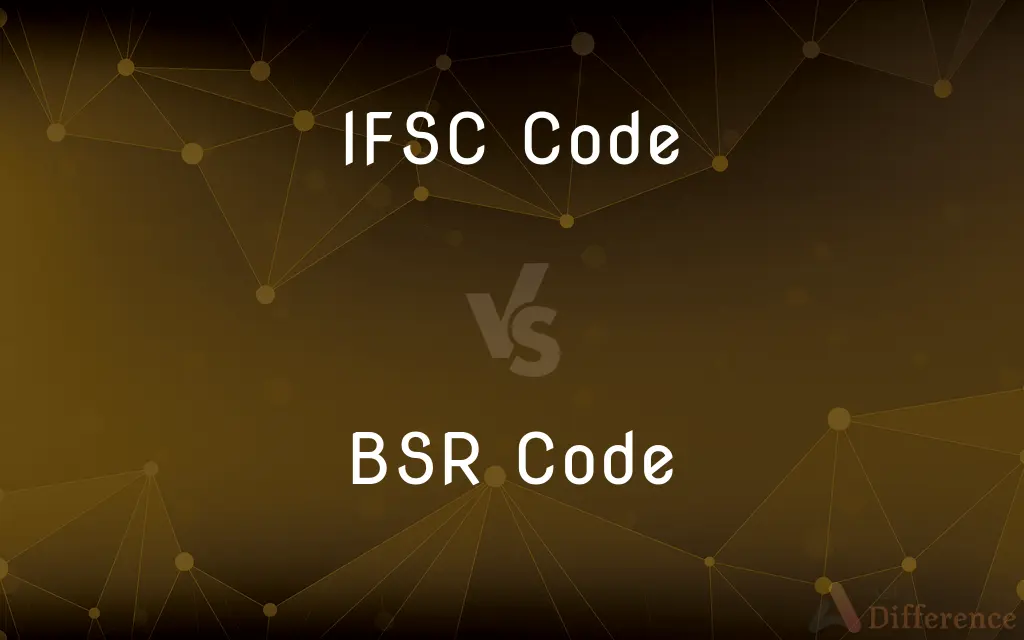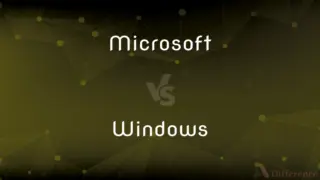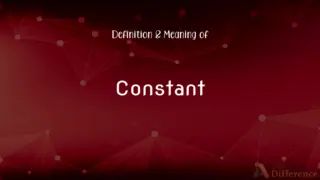IFSC Code vs. BSR Code — What's the Difference?
By Tayyaba Rehman — Published on November 11, 2023
IFSC Code is used for electronic fund transfers in India, identifying bank branches, while BSR Code is used for tracking tax deductions at source by the Indian Income Tax Department.

Difference Between IFSC Code and BSR Code
Table of Contents
ADVERTISEMENT
Key Differences
IFSC Code and BSR Code both play crucial roles in the Indian banking system, albeit for different purposes. The IFSC Code is essential for electronic fund transfer processes, including NEFT, RTGS, and IMPS. In contrast, the BSR Code is primarily used by the Income Tax Department to monitor TDS/TCS payments, enabling them to track and associate them with the corresponding bank branches.
The IFSC Code is an 11-character alpha-numeric code. It is used to uniquely identify each branch of every bank in India, ensuring that electronic transfers are processed correctly. On the other hand, the BSR Code, which stands for Basic Statistical Return, is a 7-digit number used specifically for tracking tax deductions at source.
While the IFSC Code facilitates seamless digital transactions across bank branches in India, the BSR Code helps in efficient tax administration. The former is more customer-facing and is used in most online transactions, while the latter is more for administrative purposes within the financial system.
Every bank branch in India has a unique IFSC Code, which is essential for the interbank electronic transfer of funds. This code provides a clear roadmap for where money is to be transferred. The BSR Code, conversely, aids the government in ensuring timely and accurate tax collections, making it easier for banks to report tax deducted at source.
In sum, while both the IFSC Code and BSR Code are integral to India's banking and finance infrastructure, they serve distinct functions. The IFSC Code focuses on the facilitation of electronic fund transfers, while the BSR Code is geared towards the tracking and administration of tax deductions.
ADVERTISEMENT
Comparison Chart
Purpose
Facilitates electronic fund transfers
Tracks tax deductions at source
Length
11 characters (alpha-numeric)
7 digits
Use in Transactions
Used in NEFT, RTGS, IMPS
Used for TDS/TCS payment tracking
Issued by
Reserve Bank of India
Indian Income Tax Department
Universality
Every bank branch in India has a unique IFSC
Banks report tax with BSR Code to the government
Compare with Definitions
IFSC Code
An alphanumeric code for identifying bank branches.
Ensure you have the correct IFSC Code before transferring money.
BSR Code
A 7-digit code for tracking tax deductions.
Companies submit TDS details using the bank's BSR Code.
IFSC Code
Unique to every bank branch.
Each branch has its own IFSC Code to differentiate it from others.
BSR Code
Stands for Basic Statistical Return.
The BSR Code is an integral part of tax administration in India.
IFSC Code
Issued by the Reserve Bank of India.
The RBI manages the issuance of IFSC Codes to banks.
BSR Code
Helps in tax administration.
Using the BSR Code, tax authorities can monitor TDS payments efficiently.
IFSC Code
Ensures accurate digital transactions.
Without the correct IFSC Code, your transaction may fail.
BSR Code
Assists banks in reporting tax deducted.
Banks use the BSR Code to communicate tax details to the government.
IFSC Code
Used in electronic fund transfers like NEFT and RTGS.
Provide your IFSC Code for the RTGS transaction.
BSR Code
Used by the Income Tax Department.
All TDS payments are associated with a BSR Code for tracking.
Common Curiosities
How long is an IFSC Code?
An IFSC Code is an 11-character alpha-numeric code.
What does the BSR Code stand for?
BSR Code stands for Basic Statistical Return.
How is the BSR Code utilized in the banking system?
The BSR Code is used to track and report tax deductions at source to the Income Tax Department.
What is the main purpose of the IFSC Code?
The IFSC Code facilitates electronic fund transfers between bank branches in India.
Who issues the IFSC Code?
The Reserve Bank of India (RBI) issues the IFSC Code.
Are both IFSC Code and BSR Code unique to each bank branch?
Yes, both codes are unique to each bank branch.
Where can I find the IFSC Code of my bank branch?
The IFSC Code can be found on bank statements, checkbooks, or the bank's website.
What authority oversees the BSR Code's functioning?
The Indian Income Tax Department oversees the use of the BSR Code.
Can a bank branch operate without an IFSC Code?
No, the IFSC Code is crucial for electronic fund transfers and every branch has one.
Is the IFSC Code used for international transactions?
No, IFSC Code is primarily used for domestic electronic fund transfers.
Who benefits from the use of the BSR Code?
The BSR Code benefits the government for tax tracking and banks for reporting tax deductions.
In what context is the BSR Code commonly used?
The BSR Code is used for TDS/TCS payment tracking by banks.
Do customers need to know their BSR Code?
Generally, customers don't need to know their BSR Code; it's more relevant for banks and tax administration.
Is it safe to share my IFSC Code?
Yes, the IFSC Code is generally safe to share as it's used for transactions, but personal details should be kept confidential.
How does the BSR Code aid the government?
The BSR Code helps the government in tracking and administering tax deductions efficiently.
Share Your Discovery

Previous Comparison
Microsoft vs. Windows
Next Comparison
Parachute vs. Hot Air BalloonAuthor Spotlight
Written by
Tayyaba RehmanTayyaba Rehman is a distinguished writer, currently serving as a primary contributor to askdifference.com. As a researcher in semantics and etymology, Tayyaba's passion for the complexity of languages and their distinctions has found a perfect home on the platform. Tayyaba delves into the intricacies of language, distinguishing between commonly confused words and phrases, thereby providing clarity for readers worldwide.











































